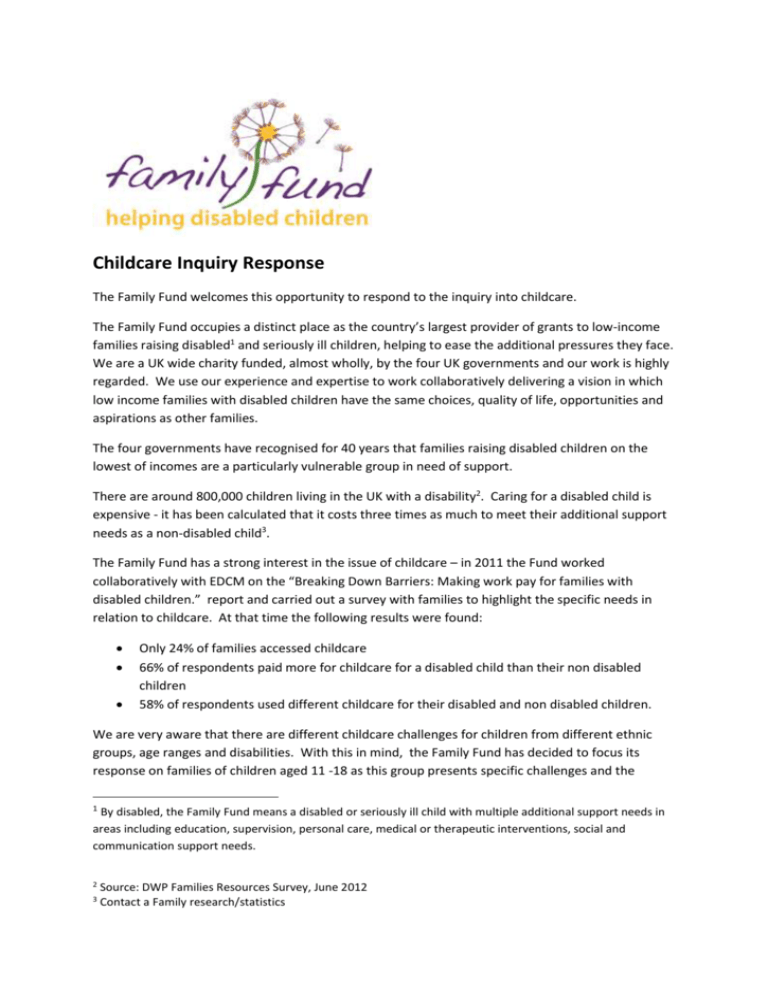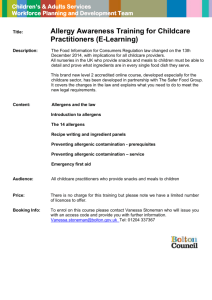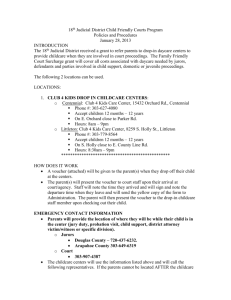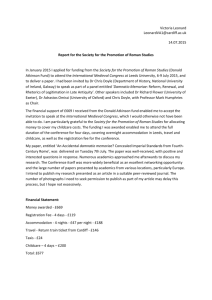Family Fund - Every Disabled Child Matters
advertisement

Childcare Inquiry Response The Family Fund welcomes this opportunity to respond to the inquiry into childcare. The Family Fund occupies a distinct place as the country’s largest provider of grants to low-income families raising disabled1 and seriously ill children, helping to ease the additional pressures they face. We are a UK wide charity funded, almost wholly, by the four UK governments and our work is highly regarded. We use our experience and expertise to work collaboratively delivering a vision in which low income families with disabled children have the same choices, quality of life, opportunities and aspirations as other families. The four governments have recognised for 40 years that families raising disabled children on the lowest of incomes are a particularly vulnerable group in need of support. There are around 800,000 children living in the UK with a disability2. Caring for a disabled child is expensive - it has been calculated that it costs three times as much to meet their additional support needs as a non-disabled child3. The Family Fund has a strong interest in the issue of childcare – in 2011 the Fund worked collaboratively with EDCM on the “Breaking Down Barriers: Making work pay for families with disabled children.” report and carried out a survey with families to highlight the specific needs in relation to childcare. At that time the following results were found: Only 24% of families accessed childcare 66% of respondents paid more for childcare for a disabled child than their non disabled children 58% of respondents used different childcare for their disabled and non disabled children. We are very aware that there are different childcare challenges for children from different ethnic groups, age ranges and disabilities. With this in mind, the Family Fund has decided to focus its response on families of children aged 11 -18 as this group presents specific challenges and the 1 By disabled, the Family Fund means a disabled or seriously ill child with multiple additional support needs in areas including education, supervision, personal care, medical or therapeutic interventions, social and communication support needs. 2 3 Source: DWP Families Resources Survey, June 2012 Contact a Family research/statistics evidence is less available on the level of need. As part of this work the Family Fund has spoken to 54 families with children and young people in this age range and where possible, included the views of disabled young people themselves. Therefore we will target our response around the specific questions and themes these families raised. The key responses from the 54 families we worked with are as follows: 57% used childcare (we included in childcare, informal and formal childcare) 42% didn’t use childcare of any type For those families using childcare, the highest percentage were using family/friends/informal support to help them with the care of their children and young people aged 11-18. Only 2% were using breakfast clubs and 31% were making use of after school clubs. Playscheme use was the highest one recorded at 34%. Families made the most comments about after school clubs and lack of provision or inclusiveness for this age group and need. Some of the comments included: “After schools clubs available up to 6pm. My child thrives in the structure of her school day so why there is nothing after this time of the day baffles me.” “I would like the school my child attends to provide child care like other state schools do. At present if I was to work I would need two separate child care facilities as I have three children one with disabilities, its too complicated and would cost more” “I would like to see standard childcare cater for a broader range of needs, if they can go to mainstream school together they should be able to go to after school club together.” “After school clubs so I don't have to rely on family for childcare when I work. This is readily available for my other boys in mainstream school as a lot of schools are but it is lacking in special school - and they can't be left home alone!” One of the key areas for families was the cost of childcare – we asked how much more they paid than standard childcare as follows: 35% pay the same as standard childcare 32% pay twice as much 25% pay three times as much 7% pay four times as much or more Families often cite cost as the reason they are unable to access childcare and employment. 52% of the parents we asked said that cost was the main barrier to accessing childcare for them and their family. Other barriers included transport, accessibility and 62% said that having trained and qualified staff would make it easier for them to confidently use childcare. “Good is the socialisation of my son with autism. Bad is the cost, and lack of specialised knowledge of my sons disability and how to handle meltdowns.” We also asked families what they would like to be provided that they do not have already – here are some of the suggestions: Saturday clubs After school clubs with transport Childcare with specialist equipment After school and breakfast clubs available every day Clubs specifically for teenagers with disabilities Meaningful sports and leisure activities which are age appropriate 52 week a year availability so parents can work Childcare that can be accessed by all the children in the same family After school clubs at special schools, not just in mainstream schools Flexible drop in childcare, lots of children’s ability to be part of a club or scheme can vary from day to day Trained and qualified staff who were respectful and inclusive of all children, regardless of their disability Opportunities for young people to meet up with their school friends in the holidays – something which many disabled young people cannot do and would like. Childcare that can meet the needs of young people with medical needs Any childcare at all! One area that was highlighted was having some choice available for young people about what they did and how they spent the time away from their families. As one parent suggested: “More information sent directly to the kids so they can choose where they want to go” “Some were he would not feel like he was been baby sat as at 15 he thinks he does not need baby sitting.” Young disabled people who responded to our survey were very clear about what they wanted as follows: “I like messy stuff and cooking I don't like noise” “I don't like going to clubs purely for disabled children. I want to mix with able bodied children too and for my younger brother to be included. Too much is provided JUST for me and my disabled sister but then my younger brother can't join in.” “I enjoy going out and mixing with people” “I used to go to social play group and drama with support from pip staff but they would stop me interacting with peers stating I should stay with them etc. I wanted dome more freedom and for them to be there when I needed them, not restrict me.” “I like being with my friends.” Childcare cannot be considered in isolation, as parents need a range of support that meets their families needs. For example, one parent told us: “Help with chores, gardening, shopping, cleaning, not childcare because we love being a family and don't want to opt out of these precious days but all the other work means our time together is compromised. But this type of help is never offered.” Affordability Cost is key to the families we work with – especially when families who care for disabled children face so many additional costs in raising their children. Parents of disabled children are often penalised in the workplace and struggle to find flexible working arrangements to meet their child’s needs. The cost of specialist childcare, even if available, forces many of the parents we work with out of employment. A voucher system or similar for parents of disabled children would allow for them to cushion the additional costs of childcare. This could offer families much needed choice and flexibility. The Fund hopes that the new Childcare Bill which was announced in the Queen’s Speech will offer some specific provisions for disabled children and an enhanced premium to meet the additional costs. Availability and Inclusion From the responses above, we can see that there are a wide range of barriers which fail to extend childcare more broadly to this group of young disabled people. Much provision is aimed at younger children and some families cited that after aged 12 there was simply nothing available. Also parents were struggling to feel confident that the childcare that was being used was entirely appropriate. A number of the parents we spoke to gave examples of abuse and discrimination in childcare settings. Availability of childcare for this age group was very limited if available at all. Parents are often unable to work because they are simply no alternative, or they are having to rely on relatives and friends to fill in the gaps. Parents wanted more for their children – opportunities for them to thrive in fulfilling leisure opportunities with their friends. The young people we spoke to wanted no more than this. Wraparound school and holiday provision was mentioned by almost all of the parents we spoke to as an absolute necessity in meeting the needs of their family. At present, these are limited and the quality is often inconsistent. Quality More training and professional development for childcare staff is needed – and this is childcare in its broadest forms – sports, leisure, youth and interest clubs need to have a level of understanding that can cater for young people with a variety of needs. A commitment to childcare provision at a governmental level which cascades to local authorities through their local offer is vital as is a range of choices and funding which is ring-fenced to protect the needs of this group of children and young people is vital. We hope that this information is useful to the inquiry and the Family Fund would be happy to provide any further assistance as required.






